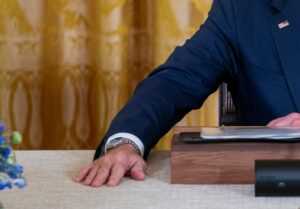In an era where the importance of truth and accuracy seems to be constantly eroding, the rise of political deepfakes poses a significant threat to the integrity of the democratic process. These digitally manipulated videos, audio clips, and images have the potential to spread confusion and misinformation to an unprecedented extent. With their ability to convincingly depict politicians saying or doing things they never did, political deepfakes have the potential to undermine public trust and further polarize our already divided society.
The term “deepfake” refers to the use of artificial intelligence to create highly realistic and often indistinguishable fake content. The technology has advanced to a point where it is becoming increasingly difficult to discern between a genuine recording and a well-made deepfake. Coupled with the reach and pervasive nature of social media platforms, political deepfakes can quickly go viral and be shared without any critical assessment of their authenticity.
One of the biggest concerns about political deepfakes is the potential for their disruptive effects on political campaigns. Imagine a scenario where a deepfake video of a candidate admitting to a serious crime or making inflammatory statements is released just days before an election. Even if it is later proven to be false, the damage would have already been done. The uncertainty and doubt planted in the minds of voters can significantly influence their decision-making process and ultimately the election outcome.
Furthermore, the speed and ease with which political deepfakes can be created and disseminated makes them a powerful tool for malicious actors seeking to manipulate public opinion. A recent study conducted by the cybersecurity company Deeptrace revealed that nearly 96% of all deepfake content found online is pornographic in nature. While this may seem harmless at first glance, it shows just how easily these technologies can be misused for personal or political gain.
Political deepfakes not only have the potential to mislead voters but also to deepen divisions and polarize society. In a time when political discourse is already strained, the spread of false information can amplify existing biases and fuel the flames of political animosity. Without proper measures in place to detect and debunk deepfakes, it becomes increasingly challenging for individuals to make informed decisions and engage in meaningful debates based on facts.
Although there are ongoing efforts to develop technologies to detect and combat deepfakes, it is an uphill battle. The rapid advancements in AI technology mean that as soon as countermeasures are developed, new techniques and algorithms are created to stay one step ahead. In addition, the vastness of the internet and the sheer volume of content being uploaded every minute make it near-impossible to escalate and address the issue effectively.
As a society, we must acknowledge the danger political deepfakes present and take collective action to mitigate their impact. This includes investing in research and technological advancements that can help detect and identify deepfakes, as well as educating the public about their existence and potential implications. Social media platforms, too, have a responsibility to enforce stricter policies and mechanisms to curb the spread of misleading and manipulated content.
In conclusion, political deepfakes pose a significant threat to our democratic process by spreading confusion and misinformation. The ability to create highly realistic fake videos, audio clips, and images can have far-reaching consequences, eroding public trust, polarizing society, and influencing political outcomes. It is imperative that we recognize and address this issue before it undermines the very foundations of our democratic system.

